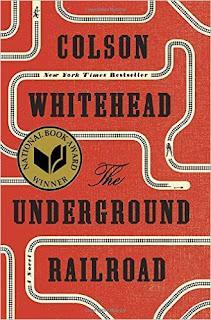In the second sentence of her New York Times review of the book, Michiko Kakutani calls The Underground Railroad "a potent, almost hallucinatory novel that leaves the reader with a devastating understanding of the terrible human costs of slavery." That it does.
The novel tells the story of Cora, a slave on the Georgia cotton plantation of an especially brutal man, a drunkard and a sadist. Circumstances and a fellow slave convince Cora to attempt an escape and what follows is the wild narrative of her long journey to freedom, with an ever-changing cast of accomplices, comrades, and brutes. Sadly, lots and lots of brutes; slave-catching was a lucrative pursuit and particularly attractive to the lowest of the low.
Cora travels via a literal underground railroad, to South Carolina, North Carolina, Tennessee, and then further west. We observe the topography of slavery from myriad, awful angles. It's a rough journey in every possible way, but thankfully it leads in the direction of redemption.
I thought, going in, that I was well aware of the depths of the slavery horror but, come to find out, I'd barely plumbed them. It's a terrible thing confronting the fact that man's inhumanity can exceed one's wildest imaginings. The challenge is not to hate back.
Reading The Underground Railroad was an experience I won't soon forget. It deepened my compassion and increased my understanding. The novel has occupied the bestseller list for over 30 weeks now, which is heartening. Maybe compassion and understanding will start to go viral.
~Ann, Adult Services

No comments:
Post a Comment